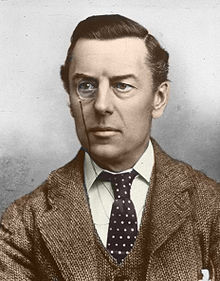Joseph Chamberlain
Joseph Chamberlain ['ʧeɪmbəlɪn] (b. 8 July 1836 in London; † 2 July 1914 ibid) was an influential British statesman of the 19th century. He was the father of future British Prime Minister Neville Chamberlain and Foreign Secretary and Nobel Peace Prize laureate Austen Chamberlain.
Chamberlain first joined his father's commercial business in Birmingham, but at the same time took an active part in political life. Thus he became chairman of the National Education Association in 1868 and of the Birmingham School Board in 1873. From 1873 to 1876 he was mayor of the city of Birmingham. His reforms of the city's public health system, the demolition of slums, his massive campaign for compulsory education, the creation of conditions for the founding of Birmingham University (1900), and the establishment of a gas and water supply under municipal control had an impact far beyond the city's borders and led to fundamental changes in the entire British municipal system. In 1876 Chamberlain was elected to the House of Commons. There he quickly became one of the most important Liberal figures. In the party he led the distinct political leftward trend of these years with demands for social, and in some cases even socialist, reform. Under Chamberlain, the Liberals developed from a parliamentary and functionary party to a mass party. Under William Ewart Gladstone, Chamberlain was Secretary of State for Trade from 1880 to 1885. In 1886 he chaired the Local Government Board.
Chamberlain was an opponent of Irish Home Rule. When Gladstone declared his support for the Homerule policy, Chamberlain resigned from his post in March 1886. He became one of the leaders of the Liberal Unionists, who split from the Liberal Party and weakened it permanently. Chamberlain leaned closely to the Conservatives with the Liberal Unionist faction of the House of Commons. In 1892 Chamberlain became the Liberal Unionist leader in the House of Commons. On April 25, 1895, he took over the Secretary of State for the Colonies under Lord Salisbury. In this office he sought to establish closer trade relations between Great Britain and the white settler colonies, and for this purpose founded a Customs Union. At the same time, he was one of the staunchest advocates of British imperial policy, encouraging, among other things, the outbreak of the Boer War. The statesman expressed his convictions of the superiority of the Anglo-Saxon race as frequently as clearly:
"As I travelled through England on my way to the United States, and then again as I crossed the borders of the Dominion (of Canada), there was impressed upon my mind at every step a thought which is written indelibly on the brow of that vast land: the thought of the greatness and importance of the destiny reserved for the Anglo-Saxon race, that proud, persevering, insisting upon its right, and resolute race, which no change of climate or conditions of life can transform, and which is infallibly destined to be the ruling race in the future history and civilization of the world. [...] We are all of the same race and of the same blood ..."
Chamberlain's efforts to forge close Anglo-American relations and an alliance with Germany (until negotiations broke down in 1901), as well as his preparatory work for the Entente Cordiale with France, put an end to splendid isolation, Britain's self-imposed foreign policy isolation.
"No forward-looking statesman can agree to England's perpetual isolation on the European mainland. The natural alliance is that between ourselves and the German Empire. The two peoples are of the same race, and the same interests unite them ... Whether in China or elsewhere, it is in our interest that Germany should stand in the way of the Russians. An alliance between Germany and Russia is the danger we have to fear.... “
In July 1903, he began to advocate a move away from the dogma of free trade policy and pushed for tariff reforms. This split the Liberal Unionist faction; some returned to the Liberals, while Chamberlain and his supporters remained in alliance with the Conservatives. In September 1903 Chamberlain resigned from the Cabinet to pursue his ideas unhindered.
In 1906 he had to give up his work after suffering a stroke. He died in London on 2 July 1914; he was buried in Keyhill Cemetery in his home town of Birmingham.
The Chamberlain River in Australia is named after him.

Joseph Chamberlain
Questions and Answers
Q: Who was Joseph Chamberlain?
A: Joseph Chamberlain was an important businessman and politician who worked to improve education and cities.
Q: What was Joseph Chamberlain's occupation?
A: Joseph Chamberlain was a politician and businessman.
Q: What were some of the areas Joseph Chamberlain worked to improve?
A: Joseph Chamberlain worked to improve education and cities.
Q: How long was Joseph Chamberlain a Member of Parliament?
A: Joseph Chamberlain was a Member of Parliament from 1876 to 1914.
Q: What position did Joseph Chamberlain hold as a politician?
A: Joseph Chamberlain was the Colonial Secretary, controlling British colonies, from 1895 to 1903.
Q: What were some of the accomplishments of Joseph Chamberlain's sons?
A: Joseph Chamberlain's son Austen won the Nobel Peace Prize, and his other son Neville was the Prime Minister from 1937 to 1940.
Q: When was Joseph Chamberlain's birth and death?
A: Joseph Chamberlain was born on July 8, 1836, and died on July 2, 1914.
Search within the encyclopedia